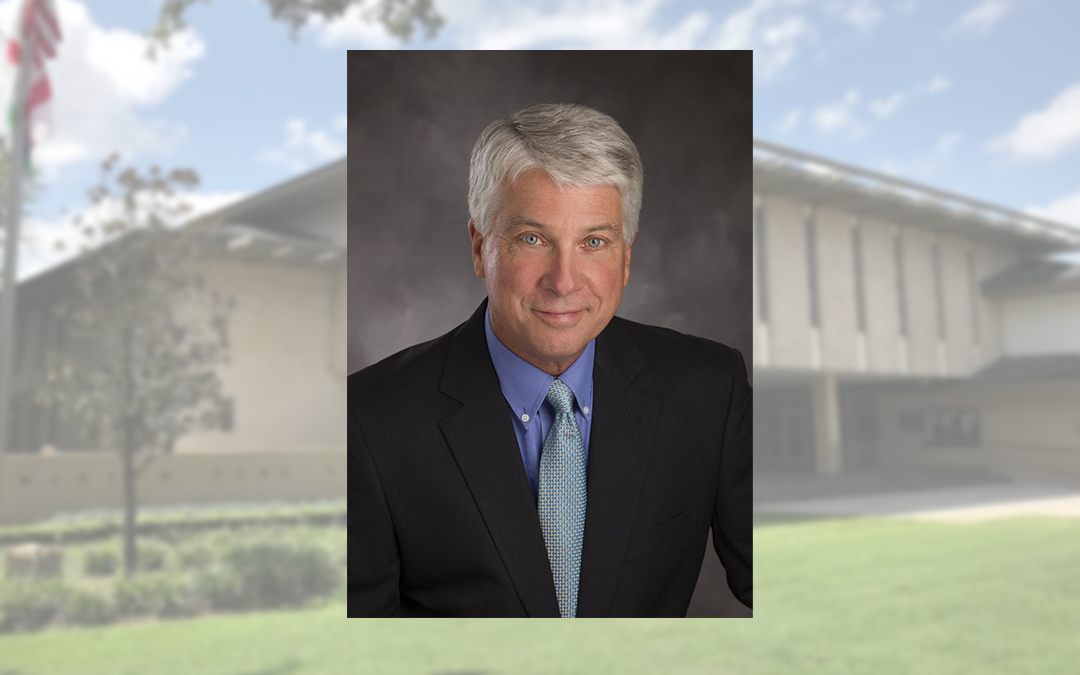
by Anne Mooney | Feb 9, 2023 | Headline, News
Did Weaver Resign . . . or not?
Commission to decide at special meeting Feb. 15
by Beth Kassab / February 9, 2023
Commissioner Todd Weaver, who announced Friday he is “stepping down,” said at Wednesday’s City Commission meeting that he now wants to remain in the job, though the board delayed a decision about whether he can do so.
Weaver, who was re-elected last year for a second three-year term, sent a mass email on Friday that said he is struggling to manage commission duties along with his business obligations and also told the Orlando Sentinel on Friday, “I’m juggling too many balls.” He signed the email with his name and “Winter Park City Commissioner 2019-2023,” two years shy of when his term would be up in 2025.
But on Wednesday he argued the email, which carried the subject line “Stepping Down” and was sent from his campaign address to constituents, supporters and others including the city clerk, was not a resignation.
“Nowhere in that notification to residents did it say I was going to resign or resign on a certain date,” Weaver said. “It was just reaching out and showing my appreciation to all of you and all of city staff … Yes, I’m struggling a little bit with time, but I’ve made some adjustments in my personal life … I’m here tonight and I want to serve.”
In question now is if the five-member commission considers Weaver’s email an official resignation. If so, City Attorney Kurt Ardaman said Seat 4 would be considered vacant and Weaver’s participation and votes on city business “could compromise the integrity of the commission’s actions.”
Ardaman said only the commission can determine if the email constituted an immediate resignation.
A vacant seat would mean the commission would appoint someone to serve until the next general election in March of 2024 when voters would select a candidate to fill the final year of Weaver’s term. No races will appear on the city ballot this year because commissioners Sheila DeCiccio and Marty Sullivan were automatically re-elected when no one filed to run against either incumbent.
Jockeying for the vacancy had already begun by the start of Wednesday’s meeting. The Winter Park Chamber of Commerce sent a letter to the Commission on Friday within hours of Weaver’s email calling for the board to appoint “someone from the African American community.”
“It has been an unacceptable 130 years since a Black person has served on the Winter Park City Commission and you now have a perfect opportunity to correct that inequity,” stated the letter from chamber President Betsy Gardner Eckbert.
Commissioner Marty Sullivan advocated to call a vote to keep Weaver on the commission.
“It’s very clear, I believe, that Vice Mayor Weaver chose to rescind that and chose to continue to stay on the commission,” Sullivan said. “It’s clear from [City Attorney Kurt] Ardaman that it’s up to us to decide whether he stays on the commission so I think it’s out of order to delay that decision on our part.”
But Mayor Phil Anderson won a vote 3-2 to delay the decision until a special meeting devoted to the matter next Wednesday. Weaver and Sullivan cast the dissenting votes.
Anderson requested an opinion on the matter from the city’s labor attorney before the next meeting.
Ardaman said that if commissioners interpret the email as an immediate resignation, then it’s likely not possible for Weaver to rescind that decision. But if they determine his intent was to resign in the future then he could potentially walk it back.
Weaver participated in votes on the remainder of the city agenda on Wednesday.
To comment or read comments from others, click here →
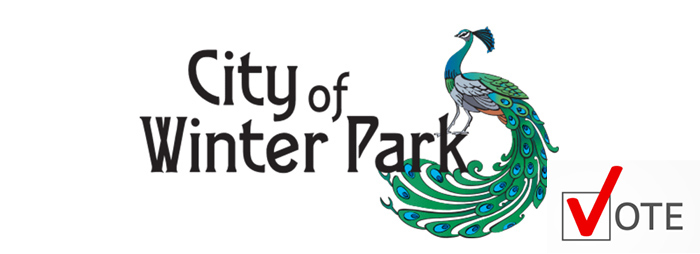
by Anne Mooney | Sep 25, 2020 | Custom Author, Headline, Taxes
FY2021 Budget Passes
Millage Rate Unchanged for Year #13
by Anne Mooney / September 25, 2020
On September 23, Commissioners passed the FY2021 Budget, holding the millage rate steady at 4.0923 for the 13th consecutive year. Ordinances establishing the millage rate and adopting the Budget passed on a 4-1 vote, with Mayor Steve Leary dissenting.
Orange County sets property valuations
Property taxes will rise slightly, since property values were assessed by Orange County in January 2020 prior to the beginning of the pandemic. This reporter’s annual property taxes rose by less than $50, so with the steady millage rate, the increase for most property owners will be minimal.
According to Peter Moore, Winter Park’s Division Director of the Office of Management and Budget, residential real estate taxes comprise about 79 percent of the City’s tax base, leaving the City on solid fiscal footing for now. The City boasts unencumbered General Fund reserves of approximately $17 million.
Postponed SunRail payments used to create contingency fund
The City also has created an approximately $500,000 contingency fund. This money was originally budgeted to pay for SunRail, but the state of Florida has postponed SunRail payments for another two years, allowing the money to be reallocated. “These funds are available now for emergency relief,” wrote Peter Moore, “as we manage the economic repercussions of the pandemic.”
Cautiously optimistic outlook for the future
Moore cautioned that while property tax revenues will be unaffected in the present, as values were established before the pandemic, possible future deterioration in the real estate market could affect Winter Park, and business closings and vacant storefronts will have a definite negative impact. “With almost $2 million in assistance either pledged or spent already by the city to assist its businesses and residents,” wrote Moore, “the city continues to work with all our stakeholders to navigate this difficult time.”
To comment or read comments from others, click here →

by Anne Mooney | Aug 1, 2020 | Custom Author, Headline, News
Commission Raises Tax Cap
But Will They Raise the Tax?
by Anne Mooney / August 1, 2020
At their July 22 meeting, the Commission set a tentative millage rate of 4.5623. That figure represents a cap, a not-to-exceed number, and it’s the first raise in 13 years. Between now and September 23, the Commission can decide to leave the rate at its current level of 4.0923, they can raise it a little, or they can raise it to the 4.5623 cap set at the July 22 meeting. Much depends on information the City still does not have, such as information regarding available funds from the state in FY 2021. Ultimately, those projections will depend upon the depth of the recession caused by the coronavirus pandemic.
Nothing is final until September 23.
Because each year’s budget is adopted by ordinance, two readings with public input are required. The first reading of the FY 2021 budget is September 9; the second and final reading is September 23. The FY 2021 Budget will be adopted and the final millage rate will be set when the Commission votes on September 23.
It’s not just the City that sets the tax rate.
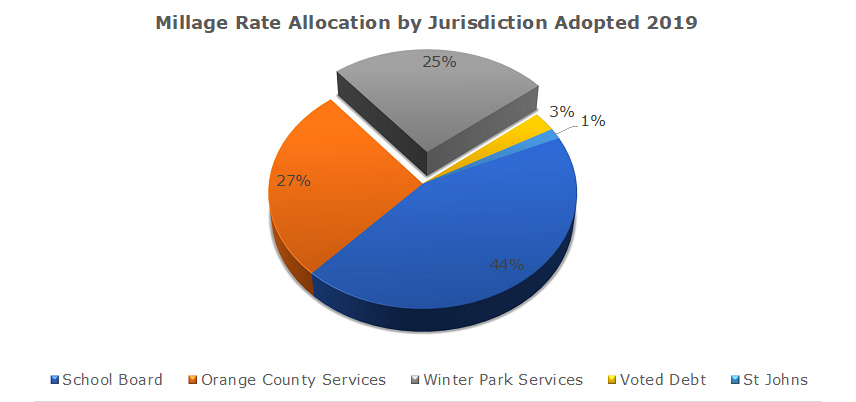
The City establishes the millage rate by creating a draft budget that seeks to balance projected expenses and revenues. Simultaneously, four other entities are doing exactly the same thing – each with eyes on our tax dollars. Our tax bill is based on a combination millage rates set by five entities — Orange County, St. Johns River Water Management District, the School Board, the City of Winter Park and the private debt created by Winter Park voters to build the Public Safety Complex and the Library-Events Center. These five millage rates will combine to form the rate we will pay on the assessed value of our property. The current rate for Winter Park is 16.3156.
Only about 25 percent of that total goes to support City services, while 44 percent goes to the schools and 27 percent goes to Orange County.
The economy has contracted in the pandemic.
According to Finance Director Wes Hamill, the City is currently facing a shortfall in 2020 of about $3 million due to the coronavirus pandemic. Hamill said he believes that by cutting costs, but without cutting services, there is still a good chance the City will break even by the September 30 year end. Some events, such as the Fourth of July parade, were cancelled because of the pandemic, thus saving those funds. Several open City positions have been frozen. If there is still a shortfall at the end of September, Hamill said the City will use reserves to cover the difference.
SunRail contribution postponed.
Hamill says he anticipates a $1.4 million decline in the FY 2021 budget from 2020. He did have one piece of good news, though. The City’s obligation to contribute to Sunrail has been delayed for two years, and will not begin until 2023.
Despite the doom-and-gloom spin circulating the blogosphere, the City remains in good shape. The proposed budget document points out, “Winter park is fortunate to have the lowest operating millage rate among major jurisdictions in Orange County.” A comparison of tax rates is below.
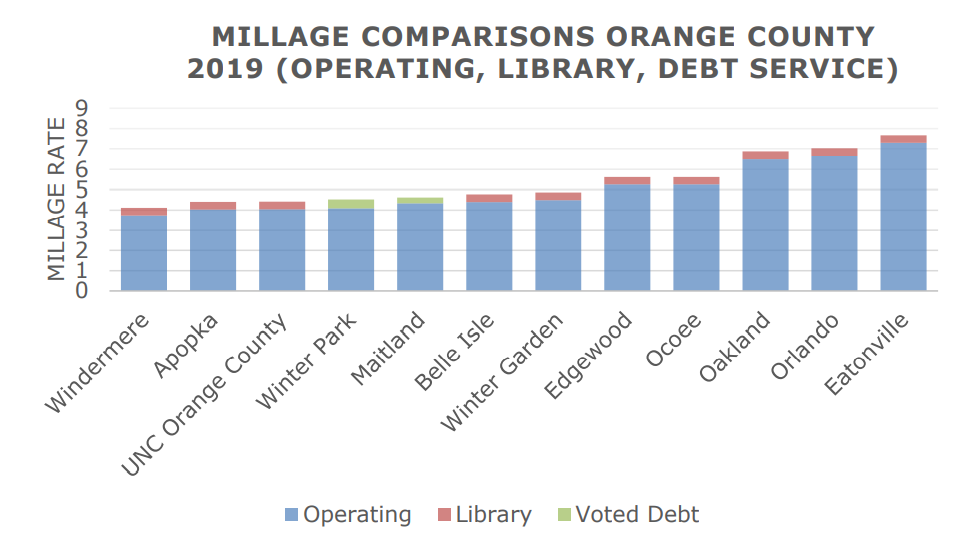
To review the entire 401-page document, click here. https://cityofwinterpark.org/docs/departments/finance/budget/proposed-budget-2021.pdf
What does this mean for us?
The chart below illustrates the impact a rise to the current Winter Park millage cap would have on the average Winter Park homeowner. (This does not include increases from the other four taxing entities.) The chart was prepared by Finance Director Wes Hamill and Assistant City Manager Michelle Neuner.

There is still much we don’t know about FY 2021projections, and these are very uncertain times. “If you asked us to guess on a hurricane, we’d be pretty good,” said Michelle Neuner. “This year, in a pandemic, it’s a little tougher.”
To comment or read comments from others, click here →
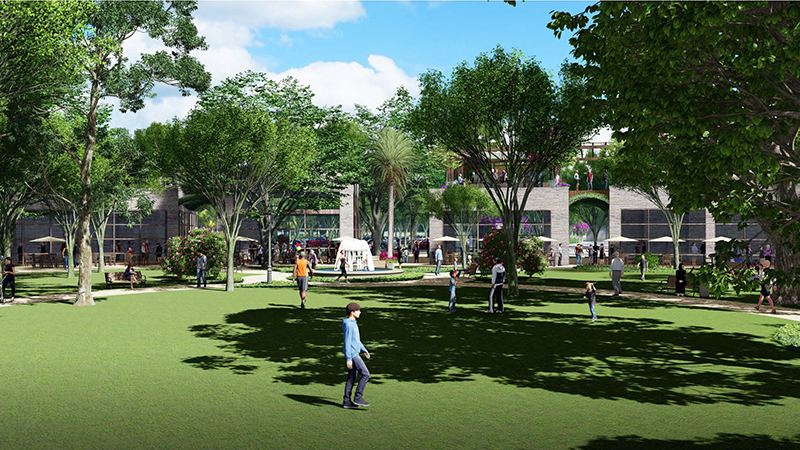
by Anne Mooney | Jul 27, 2020 | Custom Author, Headline, Visioning, Zoning and Development
Progress at Progress Point
Commissioners Explore What Progress Point Will Look Like
by Anne Mooney / July 27, 2020

Imagining Progress Point
Amidst the confusion and frustration surrounding the Orange Avenue Overlay (OAO), a Commission work session on Thursday, July 23, offered a glimmer of hope there might soon be progress at Progress Point. The work session centered around ideas of what could happen at the City-owned property located at the center of the proposed overlay district, roughly half-way between the two large properties at either end, one owned by the Holler family interests, the other by Demetree Global.
Progress on Progress Point.
Commissioners met Thursday to explore the possible fate of Progress Point – an empty, blighted parcel of land snugged up against the railroad tracks that the City acquired in the infamous land swap of 2011, when the City traded the old State Office Building parcel at the corner of Morse Blvd. and Denning Dr. for the Progress Point property on Orange Ave.
Commissioners plan to make plans.
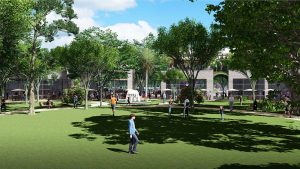 Since the meeting was a work session, the Commissioners could take no action. They did, however, agree upon what action they plan to take when the opportunity presents itself at the next commission meeting. Four Commissioners were present – Sheila DeCiccio, Marty Sullivan, Todd Weaver and Vice Mayor Carolyn Cooper. Mayor Steve Leary was absent.
Since the meeting was a work session, the Commissioners could take no action. They did, however, agree upon what action they plan to take when the opportunity presents itself at the next commission meeting. Four Commissioners were present – Sheila DeCiccio, Marty Sullivan, Todd Weaver and Vice Mayor Carolyn Cooper. Mayor Steve Leary was absent.
After a joint presentation by a consortium that included ACi architects, LandDesign, HR Miller Landscape Architect and Steve Goldman about what Progress Point could look like, were the City to go that direction, the Commissioners agreed upon six basic principles that would guide their decisions regarding Progress Point.
What’s planned for Progress Point?
The City will maintain control and ownership of the property, though the Commissioners said they would consider the possibility of a land lease to a private developer or to a non-profit concern created specifically for the purpose. No residential property will be built on Progress Point. The parcel will contain approximately 1.5 contiguous acres of green park space and a 12-foot-wide bike path along a relocated Palmetto Avenue. Businesses in any structures built on the parcel must enhance the park experience for residents and visitors. The City will realign Palmetto Avenue, moving it south, closer to the railroad tracks, to provide more contiguous land for parking and the 1.5-acre park.
The Commissioners allocated $150,000 for the engineering and design necessary to relocate Palmetto Avenue, build surface parking and the pedestrian/bicycle path. This will enable planners to determine what infrastructure improvements will be needed to support the types of businesses that would be appropriate for that site. An additional $10,000 will go for a plan to connect the urban park spaces throughout the City of Winter Park.
This chapter of OAO history begins with OAO Steering Committee. (This is not Chapter One.)
In late 2019, after a lengthy series of meetings and public input, a 10-member OAO steering committee submitted their recommendations to the City for the adoption of an ordinance to create the OAO. The steering committee voted 8-2 in favor, with Michael Dick and [future] Commissioner Sheila DeCiccio dissenting. Michael Dick felt development entitlements for the two large property owners were overly generous. Ms. DeCiccio objected to the city planners’ idea of selling the Progress Point property to a developer for office space and a parking garage that would contain extra parking to be shared with surrounding small businesses. Instead, DeCiccio wanted the City to retain ownership.
First Reading January 13 – 16, 2020.
The ordinance to create the OAO went to the Commission on January 13 for its first reading. That Commission meeting, which began January 13 at 3:30 pm, lasted until approximately 2:30 am January 14, and was continued January 16 for another five to six hours. The ordinance, which included provisions for the 1.5-acre park, passed on a 3-2 vote, with Mayor Leary and Commissioners Sarah Sprinkel and Greg Seidel supporting, and Commissioners Carolyn Cooper and Todd Weaver dissenting.
Approved on Second Reading ‘as amended’ March 9.
The OAO ordinance was sent to Tallahassee for approval and came back to Winter Park for its second reading March 9. At the March 9 Commission meeting, the ordinance was approved as amended – there were more than 50 amendments.
New Commission March 17.
On March 17, a new Commission was elected. Commissioners Sarah Sprinkel and Greg Seidel did not seek re-election, and Commissioners Sheila DeCiccio and Marty Sullivan took their places. By then, the novel coronavirus pandemic had set in, delaying the swearing-in of the new Commissioners until March 27.
Ordinance rescinded March 30.
On March 30, the newly-seated Commissioners rescinded the OAO ordinance. Their stated intent was not to kill the OAO, but to revisit some of the rules and regulations regarding the density, size and height of new development, particularly on the larger properties. Commissioner DeCiccio also wanted to make sure Progress Point remains under City ownership.
City Sued April 24 and May 12
On April 24, Demetree Global filed suit against the City as WP Station Tower, LLC, Winterpark Station, LLC, Wintergate, LLC, and Palmetto Building 2019, LLC. The Holler properties, as DI Partners, LLLP, and CVJCR Properties, Ltd., LLLP filed suit shortly after, on May 12. The complaints request the courts to declare the ordinance rescinding the OAO null and void.
City declares temporary moratorium July 22.
While there is no restriction on development within the OAO under the City’s current zoning rules, the temporary moratorium prevents new OAO development based on the regulations in the rescinded OAO zoning plan. The moratorium is expected to last until the current Commission comes up with a revised version of the overlay plan.
Commissioners have scheduled a series of work sessions throughout the remainder of the summer to come up with a plan to move forward on development rules for the OAO district.
The process of creating the Orange Avenue Overlay is far from over. What happens at Progress Point may well be the first step.
To comment or read comments from others, click here →

by Anne Mooney | Jul 13, 2020 | Custom Author, Election, Headline
Primary Elections – August 18
Do Not Ignore This One — Get Out and Vote!
by Anne Mooney / July 13, 2020
While everyone’s attention is focused on the November elections, the August 18 Primary Election will also have an immediate and lasting impact. Mark your calendars and get out and VOTE.
Register to Vote
The deadline to register to vote or to update your party affiliation for the August 18 Primary is July 20. You can do this online at RegisterToVoteFlorida.gov, or by phone by calling 407-836-2070. You can go in person to any driver’s license office, the Winter Park Public Library, or the Orange County Elections office at 119 W. Kaley St., Orlando FL, 32806.
Vote by Mail
The deadline to request a Vote by Mail ballot is August 8 at 5:00 pm. You can request a Vote by Mail ballot online at ocfelections.com, by phone at 407-836-8683 or by email at voter@ocfelections.com.
Early Voting
If you prefer to cast your ballot in person before Election Day, go to <ocfelections.com/early-voting> to find an early voting location that is convenient for you. Unlike on Election Day, when you must vote at your assigned polling place, you can vote at any early voting center. Early voting dates are August 3 – 16. Note the locations, dates, and hours of operation on the <ocfelections.com> website. Be sure to bring photo and signature identification.
What’s on the Ballot?
In addition to several partisan races, there are five non-partisan races, so what appears on the ballots will depend upon your party affiliation.
Republicans will vote for the Congressional Representative from District 7, a State Committeeman, a State Committeewoman, four judges for the 9th Judicial Circuit and a member of the School Board.
Democrats will vote for State Attorney, Sheriff, Property Appraiser, four judges for the 9th Judicial Circuit and a School Board member.
Those with No Party Affiliation will vote only for the School Board member and the four Circuit Court judges.
You can confirm your voter status and find your polling place on the ocfelections.com website. If you have questions, call 407-836-2070 and someone will be able to assist you.
To comment or read comments from others, click here →
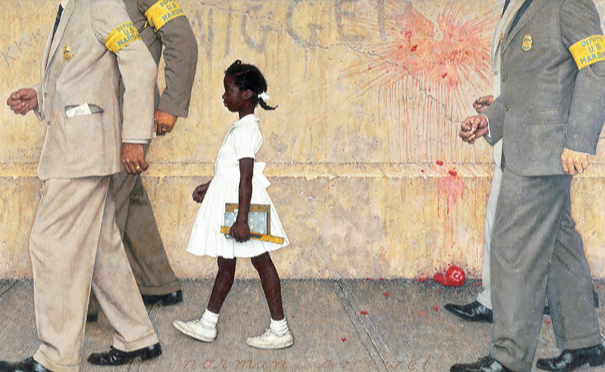
by Anne Mooney | Jun 19, 2020 | Custom Author, Headline
Juneteenth - Celebrating with Personal Pledges
Valada Flewellyn and Charley Williams / June 19, 2020
Skin on the Rope
by Valada Flewellyn
We all have skin on the rope
Whether a neck on the rope
Or a hand on the rope
We all have skin on the rope
The pain of that connection
Grips us, entangles us
Compels us to examine
Our history, then construct
Tomorrow to manifest the
Wounds that need
More than a band-aid
Wounds that warrant more
Than a cursory examination
We must dissect the
Fibers of our history
Inspect our suspect
Moral Consciousness
Which allows sin to fester
As we turn our heads
Away from the atrocities
That grab our children
Drowning them in the muck
Of our making
Leaving them unprepared
Unprotected but infected
Generation after generation
From our refusal to acknowledge
How we have Failed
Our children . . . All
We ALL have skin on the rope.
January 28, 2020
Crafting Our Pledges
Ending systemic racism starts with taking responsibility. Each of us must craft his or her own pledge, beginning with the word “I.” Valada and I encourage WP Voice readers to craft their own pledges. We will begin the conversation by giving you ours.
Charley Williams’ Pledge:
I commit to learning more about the root causes of racism, how it spreads, how I enable it and how it is incorporated into life-damaging policies on things like voting, education, access to health care and mass incarceration. I will listen. I will call out racial bias when I see it. It starts with me.
Charley Williams, Voting Advocate
Valada Flewellyn’s Pledge:
I pledge to support my white neighbors, colleagues, friends and family who are courageous enough to pledge themselves to ending racism in this country. I pledge to listen to, to pray, not to hold either the white race or my own race harmless for how long we have allowed this evil to exist in our society to the detriment of our children.
Valada Flewellyn, Poet
Addressing Our Past
First, It is imperative that we address past atrocities, which have for too long been swept beneath the rug of history — Wilmington, NC (1898), Ocoee, FL (1920), Tulsa/Greenwood, OK (1921), Rosewood, FL (1923), Groveland, FL (1951). The Equal Justice Institute’s (EJI) research shows that over a 73-year period, from 1877 to 1950, more than 4,000 racial lynchings were conducted in the South. That’s the equivalent of one lynching per day for 11 years. Enough.
We Need to Know Our Own History
The outrage is real and deep. Up until 1950, only whites could vote in a City of Orlando primary election, which was controlled by a Florida Democratic Party organization called the ‘White Voters Executive Committee.’
Our single biggest challenge is that we don’t know our own history. It’s time to face it.
This history belongs to every one of us. No one can escape. The horrific legacy of lynching and racial terror continues to haunt and plague us. White people have constructed and maintained this centuries-old institutionalized racism; therefore, it only makes sense that, with the help and cooperation of our black friends and neighbors, the whites must shoulder the brunt of the burden of dismantling it. But no one community can do this alone. We all need help from one another.
We must face our shadow stories, state our personal pledges, encourage and engage in the “courageous conversations.” Please join us now as we learn to listen, strive to learn and learn to act. Together, we can create a future that is our gift to our children and our grandchildren.
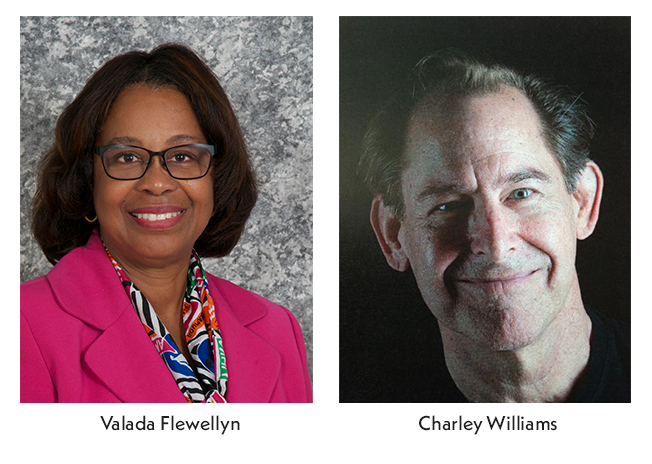
Valada Flewellyn is a poet and the author of “For the Children: The History of Jack and Jill of America, Incoporated.”
Charley William is past President of the Orange County League of Women Voters.
Flewellyn and Williams are Founding members of Alliance for Truth and Justice, a volunteer group started in 2015 to research the Ocoee Voting Day Massacre of 1920, in cooperation with the Equal Justice Initiative, headquartered in Montgomery, Alabama. More at www.ocoeemassacre.com
To comment or read comments from others, click here →













Recent Comments